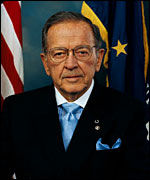
Ted Stevens, the Republican senator whose vacation home was recently raided by the FBI, and who made over $800,000 from a shady real estate deal last year, has come up with a brand-new theory of global warming. He told a NBC reporter in Alaska:
We’re at the end of a long, long term of warming, 700 to 900 years of increased temperature, a very slow increase. We think we’re close to the end of that. If we’re close to the end of that, that means that we’ll start getting cooler gradually, not very rapidly, but cooler once again and stability might come to this region for a period of another 900 years.
This was Stevens’ way of telling the villagers of Shishmaref, which is being washed away by rising waters despite the Army Corps of Engineers’ construction of massive sea walls, that they’re on their own.
It’ll be interesting to see if the denialists at Planet Gore, so quick to attack anyone who dares make an issue of global warming, will leap to the defense of Stevens’ claim, which as far as scientists can tell, appears to be a personal fantasy.
Intriguingly, five years ago, Stevens sang a different tune, as as Timothy Egan of the New York Times reported:
In Alaska, rising temperatures, whether caused by greenhouse gas emissions or nature in a prolonged mood swing, are not a topic of debate or an abstraction. Mean temperatures have risen by 5 degrees in summer and 10 degrees in winter since the 1970’s, federal officials say.
While President Bush was dismissive of a report the government recently released on how global warming will affect the nation, the leading Republican in this state, Senator Ted Stevens, says that no place is experiencing more startling change from rising temperatures than Alaska.
Among the consequences, Senator Stevens says, are sagging roads, crumbling villages, dead forests, catastrophic fires and possible disruption of marine wildlife.
These problems will cost Alaska hundreds of millions of dollars, he said.
“Alaska is harder hit by global climate change than any place in the world,” Senator Stevens said.
Perhaps he saw some federal money in the issue at that time. Stevens is good at finding federal money — remember the Bridge to Nowhere?
(h/t: TPM)



